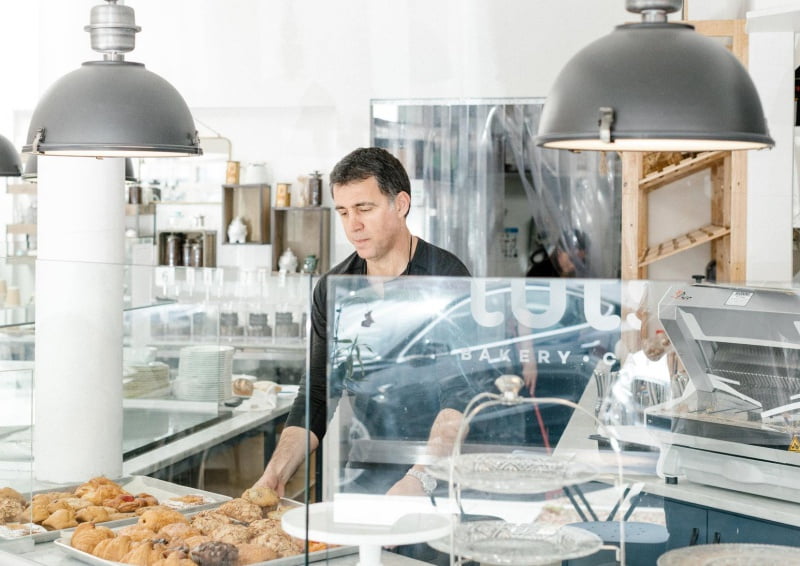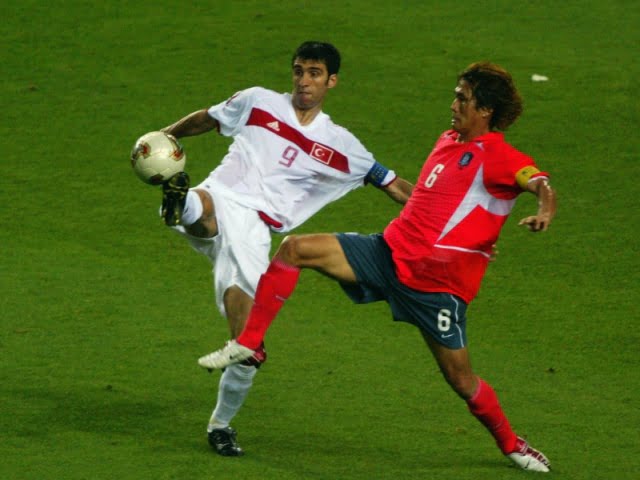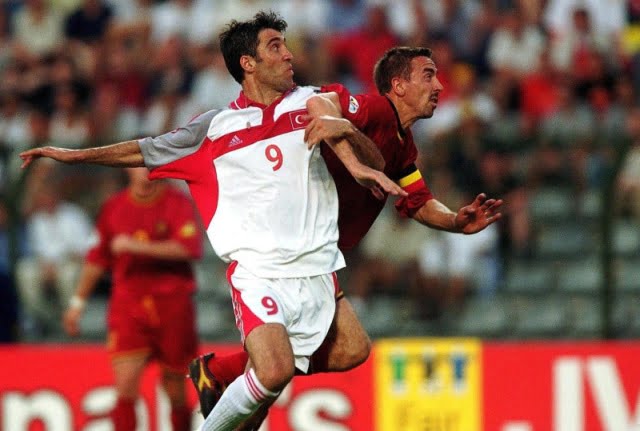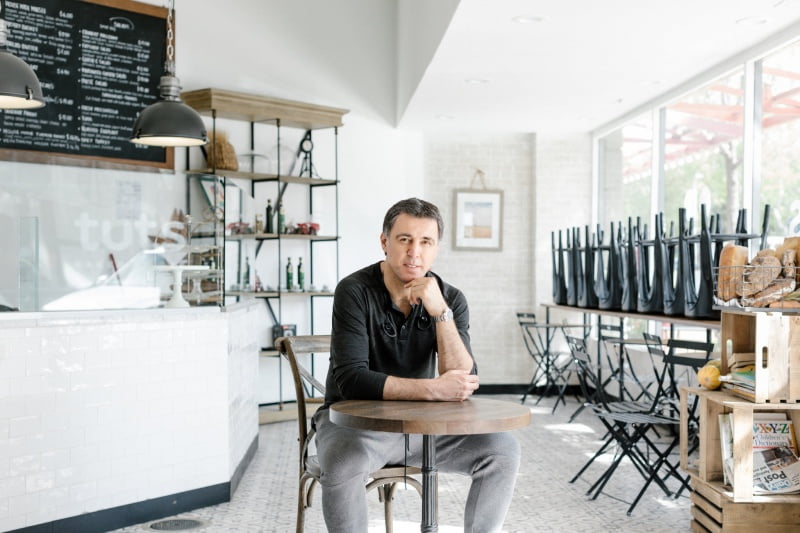The Famous Soccer Player Hiding in Plain Sight in a California Bakery

Date posted: May 5, 2018
John Branch
PALO ALTO, Calif. — Most customers do not recognize the fit, well-dressed man walking around Tuts Bakery and Cafe, picking up used cups and dirty dishes. Why would they? And what would he be doing here?
They enter and gawk at the pastries artfully displayed under glass or stare at the big chalkboard menu on the wall, written in the man’s neat hand. They step to the register and order lattes or teas, maybe the avocado tartine or menemen, the traditional Turkish breakfast. At lunch, maybe the Soujouk sausage panini or the Turkish meatballs.
The meatballs — that is what Hakan Sukur ate as he explained how he got here. And by here, he is not referring just to this upscale cafe, or Palo Alto, or even America. But here. In this predicament, exiled from home and hiding in plain sight.
Sukur, 46, is one of Turkey’s most famous athletes, its most celebrated soccer player, a World Cup hero and a veteran of several of Europe’s top leagues. He parlayed his fame into a political career and was elected to Turkey’s Parliament. Even with his sideburns tinged gray, his face and name are instantly recognized back home.
So how did Hakan Sukur end up here — wondering if he’ll ever go home again, if his children will ever see his aging parents, if his country will turn back toward democracy and let him in again?
“It’s my country; I love my people, even though their ideas about me are distorted by controlled media,” Sukur said. “Maybe in the future we will go there and visit.”
His English is good, and improving quickly, but when the conversation gets serious, Sukur starts a sentence in English and finishes deep, long stories in Turkish, letting an interpreter make sure the words come out right. It was his first interview since he left Turkey in 2015, nearly a year before the 2016 deadly coup that tried, and failed, to topple the authoritarian regime of President Recep Tayyip Erdogan, a former friend and political ally.
An estimated 250 people died, and more than 60,000 have been jailed since — journalists, academics, political opponents or anyone brave or foolish enough to spout an opposing viewpoint. Erdogan has taken strong-armed control of the military, the courts, the media and, most recently, the internet.

Sukur, in all black, playing a pickup soccer match last month at a park in Mountain View, Calif. Credit: Jason Henry for The New York Times
Sukur, his wife and their three children were already out of the country by the time of the coup attempt, sensing the deteriorating state of affairs there. But Sukur’s political ties, fame and wealth made him a target of Erdogan’s widespread distrust and accusations.
Sukur had warrants out for his arrest, and his father was jailed for nearly a year. Sukur, as famous as anyone in Turkey, said his houses, businesses and bank accounts there had all been seized by Erdogan’s government.
While it had been reported in Turkey that Sukur was hiding in the United States, it was only last fall that Turkish state-run media reported his precise whereabouts, publishing photographs and a video of Sukur surreptitiously recorded in Palo Alto.
Friends in Turkey secretly tell him that he could return and have it all back if only he would be publicly supportive of Erdogan and the Turkish government.
“I would have lived a very good life and become a minister if I had played the game accordingly, if I did what they say,” Sukur said. “But now I am selling coffee.”
He smiled, content on the high road, trying to be optimistic. Over meatballs, searching for a translatable metaphor, Sukur mentioned Norway, where the black winters are always followed by bright summers.
“There is not always darkness,” Sukur said. “I believe one day the light will return. Darkness doesn’t last forever.”
And in a few minutes, Turkey’s most famous fugitive unfolded his body and stood from the chair, smiled and started to clear dishes from nearby tables. In Turkey, in the good years, he would have been mobbed by fans. Here, nobody paid him any attention.
Still a Player
Sukur does not venture far from the goal. He is still tall and lean, if a bit more lumbering than he once was, but his feet retain their quickness. A pass comes. The ball dances at his toes, suddenly a blur. A defender makes a stab and leans too far one way. In an instant, the ball is in the net. Nobody cheers because there is no audience.

Sukur, left, with Yoo Sang-chul of South Korea during the third-place game at the 2002 World Cup. Sukur’s most famous goal came in the game: He scored 11 seconds into Turkey’s 3-2 victory.
Last week, Sukur scored 11 of his team’s 15 goals. His teammates and opponents on Wednesday nights at a park near Google’s headquarters are locals — tech workers, cooks, whatever — with professional soccer backgrounds and, in most cases, accents that echo a distant home.
They all know who Sukur is. And was.
Sukur remains the career leading scorer for Turkey’s national team, with 51 goals. His most famous came when he scored 11 seconds into the third-place match of the 2002 World Cup, leading Turkey over South Korea, the host country. That is the one he usually hears about.
“I scored a lot of goals,” Sukur said with a smile. “Not just a fast goal.”
There were about 150 of them, ranging from the Champions League and UEFA Cup to Turkey’s top-tier Super Lig, where Sukur spent most of his career. He came up first for Bursaspor, then spent many years and more than 300 matches with the Istanbul powerhouse Galatasaray, which Sukur led to eight league titles and to a surprise victory in the 2000 UEFA Cup. A stirring run there culminated in a penalty shootout victory against Arsenal.
He also played for Torino in Italy’s Serie A, and later for Inter Milan. He played against Premier League competition with England’s Blackburn Rovers. He retired from Galatasaray in 2008 as famous as anyone in Turkey, known as Kral (King) and the Bull of the Bosphorus, for the strait that cleaves Turkey in two, symbolically separating Europe and Asia.
After some time as a television pundit, Sukur ventured fully into politics. He won a seat in Turkey’s Parliament in 2011 as a member of the Justice and Development Party — Erdogan’s party.
Sukur was also a disciple of Fethullah Gulen, a cleric who has lived in self-imposed exile in Pennsylvania for nearly 20 years. Gulen’s Hizmet movement has, for decades, infiltrated Turkey’s institutions with a moderate strain of Islam, trying to nudge the country from the inside toward democracy, education and cultural openness more associated with Europe than much of today’s Middle East.
Many believed the movement played a more insidious role, ranging from a series of trials where Gulenist prosecutors and police created fake evidence to help remove powerful members of the military to possible involvement in the coup itself.
Erdogan, a former Istanbul mayor who became prime minister in 2003, was once an ally and businessman charting a course toward joining the European Union. He was credited with spurring Turkey’s democratic reforms and its ascension as a global economic player.
But Erdogan slowly and increasingly became wary of any who threatened his power. He took aim at the military with arrests and high-profile trials. In 2013, leery of Gulen’s supporters throughout the police and judiciary, Erdogan closed a vast network of Gulen-backed preparatory schools.

Sukur during Euro 2000. He played more than 100 times for his country but now fears arrest if he returns to it.
That was the last straw for Sukur, who quickly resigned from Erdogan’s party. Tensions and hostilities quaked through Turkey as Erdogan clamped down on the areas of society he saw as threats, including the news media. Opponents were silenced and increasingly jailed. Sukur, with his popularity and influence, was among the most prominent of the new enemies.
“After I left the Parliament, I started to face administrative issues with my businesses there,” Sukur said. “Whatever I wanted to do, there was some problems and issues. I thought that maybe I will just take some time off, since the work was limited. Maybe I’ll get peace of mind and see my opportunities.”
In the fall of 2015, Sukur came to Palo Alto, where he had friends. It was close to world-famous Stanford University, the hub of tech innovation and a diverse home of people from all over the world. Sukur liked it.
“Good weather, good life,” Sukur said.
He spent a month in California, he said, while Turkey’s upheaval worsened. He bought a share of the bakery and cafe that a friend was opening in 2016, secured an investor’s visa and told his wife, Beyda, and their children (two daughters, now 18 and 16, and a son, age 12) to come.
“I want them to be free, to be independent people,” Sukur said. “Being in Turkey, the children of a famous person, maybe they are treated differently. I wanted my kids to go to other countries, learn different cultures, meet different people and stand up as individuals. That was one reason we came here. And once things got worse in Turkey, we thought it was a good time.”
The coup came months later. Gulen was suspected of orchestrating it from Pennsylvania (something he denied in a 2016 Op-Ed in The New York Times). Sukur, by association, was suspected of being part of what Erdogan considered Gulen’s terrorist organization.
Sukur denies any involvement in or knowledge of the coup. Other famous pro-Gulen Turkish athletes face similar suspicion and consequences should they return to Turkey. Among them are some of Sukur’s former teammates and Enes Kanter of the N.B.A.’s Knicks. Sukur and Kanter speak regularly; Kanter was visiting Sukur this week.
Sukur knows he is vastly luckier than most people in Turkey who are unable or unwilling to speak their minds, or who have been imprisoned for doing so. Still, agreeing to be interviewed carried some anxiety, knowing his words will be parsed in Turkey and may be used against family and friends there.
Sukur is mindful of his security in the United States but not overly so. He moves freely but preferred not to meet at home. He asked that the names of his children not be used in this article.
“Like LeBron James — he speaks about the president, the government,” Sukur said. “It’s very important to freedom. You can say anything. But in my country, I say anything, now it’s a problem.”

Sukur said recently he had a conversation with a friend, a Turkish television personality, and they agreed on how bad things were in Turkey. Then he saw an interview the friend gave to a Turkish newspaper, complimenting the government.
“I just talked to him the other night,” Sukur said. “He said, ‘What else can we say here?’ He even said, ‘If you keep silent, maybe you can return and they will not do anything.’ ”
That is not possible, Sukur said.
“There are thousands and thousands of people living in this situation,” Sukur said. “I wouldn’t be so selfish to just defend my own rights, to just keep my benefits over everything else. I would lose all respect to myself.”
The Long-Term Plan
Sukur and his family regularly speak to his parents through FaceTime. His father, 77, is out of jail but fighting cancer. His mother thanks God for the people who invented her phone so that she can see her son’s face.
“Last Friday my father says to my son, ‘I miss you,’ ” Sukur said in English, before turning to Turkish to finish the story. “ ‘I want to hug you.’ And then my son started to cry, and my father was crying, and we were all crying. I know there are millions of people living in these conditions in the U.S. for a very long time, unable to go home and hug their loved ones.”
Sukur sees himself as an immigrant, trying to build his own American dream for his family. His visa expires in 2020, he said, and he has applied for green cards for his family and himself. He is anxious about getting them. His long-term plan in the United States is not to run a cafe, but to coach and build a sports academy, like he thought he would do in Turkey. Turkish friends have considered supporting him but are nervous because of the politics a world away.
“At the moment there are a couple of investors,” Sukur said. “But now people are afraid to be seen with me. But I’m also open to work with American investors and sportsmen. I feel like I can contribute. I have a lot of networks, in Europe and in the world. I think I can contribute a lot.”
Like most of Sukur’s customers, not all the neighbors know who he is — or was. They see him and his family as people from Turkey, making a go of it here.
“One of my neighbors came here to my bakery, and people were taking pictures with me,” Sukur said. “He asked me: ‘Why do they take pictures with you? You are not so handsome.’ ”
Sukur laughed. The afternoon rush had ended, and he had time to relax.
Source: New York Times , May 3, 2018
Tags: Freedoms | Hizmet (Gulen) movement | North America | Persecution of Hizmet by Erdogan | USA |
























